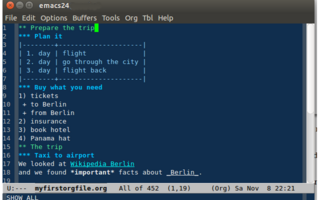
An outliner is a specialized type of text editor used to create and edit outlines, which are text files which have a tree structure or a tree view, for organization. Textual information is contained in discrete sections called "nodes", which are arranged according to their topic–subtopic (parent–child) relationships, like the members of a family tree. When loaded into an outliner, an outline may be collapsed or expanded to display as few or as many levels as desired.

File Explorer, previously known as Windows Explorer, is a file manager application and default desktop environment that is included with releases of the Microsoft Windows operating system from Windows 95 onwards. It provides a graphical user interface for accessing the file systems, as well as user interface elements such as the taskbar and desktop.
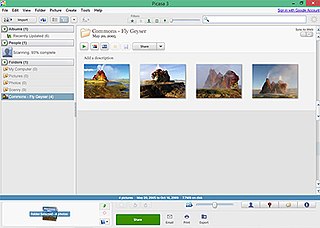
Picasa was a cross-platform image organizer and image viewer for organizing and editing digital photos, integrated with a now defunct photo-sharing website, originally created by a company named Lifescape in 2002. "Picasa" is a blend of the name of Spanish painter Pablo Picasso, the word casa and "pic" for pictures.
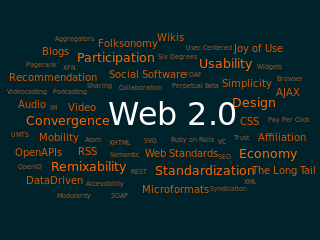
In information systems, a tag is a keyword or term assigned to a piece of information. This kind of metadata helps describe an item and allows it to be found again by browsing or searching. Tags are generally chosen informally and personally by the item's creator or by its viewer, depending on the system, although they may also be chosen from a controlled vocabulary.
In computing, a virtual folder generally denotes an organizing principle for files that is not dependent on location in a hierarchical directory tree. Instead, it consists of software that coalesces results from a data store, which may be a database or a custom index, and presents them visually in the format in which folder views are presented. A virtual folder can be thought of as a view that lists all files tagged with a certain tag, and thus a simulation of a folder whose dynamic contents can be assembled on the fly, when requested. It is related in concept to several other topics in computer science, with names including saved search, saved query, and filtering.

OmegaT is a computer-assisted translation tool written in the Java programming language. It is free software originally developed by Keith Godfrey in 2000, and is currently developed by a team led by Aaron Madlon-Kay.
A personal wiki is wiki software that allows individual users to organize information on their desktop or mobile computing devices in a manner similar to community wikis, but without collaborative software or multiple users.
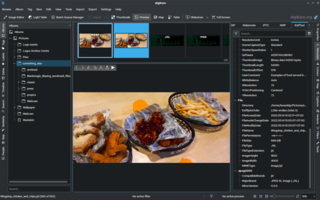
An image organizer or image management application is application software for organising digital images. It is a kind of desktop organizer software application.
The tables below compare features of notable note-taking software.
ViewMinder is a computer application for managing content, rights and usage of digital images using structured metadata. The program was first published in August 2003. The freeware version, ViewMinder Express, had the same features but could organize no more than 250 pictures.

BibDesk is an open-source reference management software package for macOS, used to manage bibliographies and references when writing essays and articles. It can also be used to organize and maintain a library of documents in PDF format and other formats. It is primarily a BibTeX front-end for use with LaTeX, but also offers external bibliographic database connectivity for importing, a variety of means for exporting, and capability for linking to local documents and automatically filing local documents. It takes advantage of many macOS features such as AppleScript and Spotlight.

XYplorer is a file manager for Windows XP, Vista, 7, 8, 10, and 11. XYplorer is a hybrid file manager that combines features found in navigational and orthodox file managers. In addition to dual folder panes it features a file tree and a tabbed interface supporting drag-and-drop between tabs and panes. The program used to be available as Pro and Free versions. The Free version is still available as a feature-limited freeware version. The "Pro" was then dropped and just known as "XYPlorer". The program is available in a fully featured trialware version.

CintaNotes is a freemium Microsoft Windows notetaking program. It provides a way to store and retrieve text collected from other documents or websites. Since version 3.0 CintaNotes supports attaching files and images to notes.

MyInfo is a personal information manager developed by Milenix Software. MyInfo collects, organizes, edit, stores, and retrieves personal-reference information like text documents, web snippets, e-mails, notes, and files from other applications.

Org Mode is a mode for document editing, formatting, and organizing within the free software text editor GNU Emacs and its derivatives, designed for notes, planning, and authoring. The name is used to encompass plain text files that include simple marks to indicate levels of a hierarchy, and an editor with functions that can read the markup and manipulate hierarchy elements.
AllMyNotes Organizer is an outliner application for Windows. It allows you to store all documents and notes in a single storage file. Documents are organized in a hierarchical tree representation for quick browsing by topic. A portable version which can be installed on a USB flashdrive, iPod, or removable hard disk drive which can be used on any PC without the need to be installed is also available.
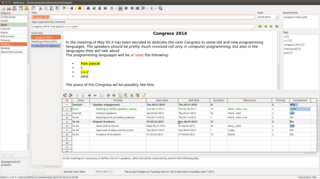
MyNotex is free software dedicated to notetaking and activity management. It offers several features for redaction, classification and search according to certain criteria. Its interface resembles a text editor and has several panes that give an overview of how content is organized.
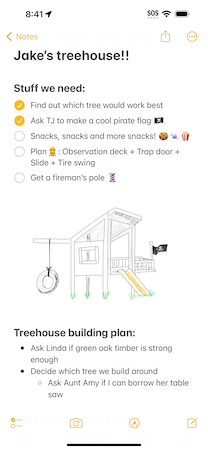
Notes is a notetaking app developed by Apple Inc. It is provided on the company's iOS, iPadOS, visionOS, and macOS operating systems, the latter starting with OS X Mountain Lion. It functions as a service for making short text notes, which can be synchronized between devices using Apple's iCloud service. The application uses a similar interface on iOS and macOS, with a non-textured paper background for notes and light yellow icons, suggesting pencil or crayon. Until 2013, both applications used a strongly skeuomorphic interface, with a lined, textured paper design; the Mountain Lion version placed this inside a leather folder. This design was replaced in OS X Mavericks and iOS 7.

Tabbles is a file-tagging application and relational file manager for Windows which is used to organize contents. It can tag any file type in any file system locally or over a network.












